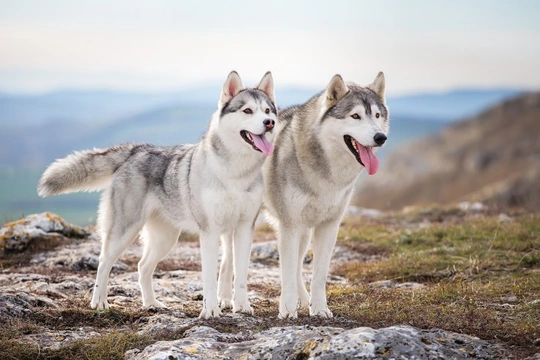
Siberian Husky frequently asked questions
Siberian Huskies are popular companions and family pets being fun-loving, playful and affectionate by nature albeit quite independent with a strong prey drive to boot. They are not the best choice for first time dog owners, but in the right environment and with the right amount of guidance and direction, a Siberian Husky is a great character to have around. If you are thinking about getting a Siberian Husky puppy, the frequently asked questions below could help you make up your mind.
Do Siberian Huskies shed much dander?
Siberian Huskies shed a lot and like other breeds they shed dander too. Huskies blow their coats twice yearly, in the spring and then again in the autumn but thanks to central heating in most homes, they shed all year round too. With this said, Siberian Huskies are not the best choice for anyone who is very house proud because they tend to leave hair all over the place and their coats require a lot of grooming to stay on top of things.
How long do Siberian Huskies live for?
Siberian Huskies, when well cared for, can live anything from 12 to 15 years. It’s really important for Huskies to be fed a good quality diet and given lots of regular daily exercise combined with a ton of mental stimulation for them to be truly happy, healthy characters.
How often should I feed a Siberian Husky?
Huskies need to be fed twice a day and it must be good quality dog food. It’s best to feed them in the morning and then again in the evening. With this said, Siberian Husky puppies must be fed more often which ideally should be 3 times a day because they are still growing and developing which in short, means they need the extra nutrients to do so.
Are Siberian Huskies good around people?
Siberian Huskies are known to be good around people and they love company. They are quite independent by nature and because they have a high prey drive, they are not to be trusted around smaller pets or animals but around people, a well socialised Husky is generally very good thanks to their good natures and the fact they are so playful.
Is it easy to train a Siberian Husky?
Siberian Huskies are notoriously independent and can have a bit of a stubborn, albeit playful, streak in them. In short, they are not the most “trainable” of dogs on the planet. Huskies must know their place in the pack and who is the alpha dog in a household or they may take on the role of dominant dog themselves. With this said, Huskies will always test the “boundaries” just to see how much they can get away with which is one of the reasons they are not the best choice for novice dog owners.
What about health problems in Siberian Huskies?
Siberian Huskies are generally very healthy dogs. However, they can suffer from several hereditary and congenital disorders which are worth knowing about. These are detailed below:
- Progressive retinal atrophy (PRA)
- Glaucoma
- Hereditary cataracts
- Hip Dysplasia
What is the Siberian Swirl?
In colder weather, Siberian Huskies have a habit of going in circles before curling up in a ball with their noses tightly tucked under their tails which is known as the Siberian Swirl. Very often, they still do this in a home environment which can be highly amusing.
What should you feed a Siberian Husky?
Like all breeds, the Husky must be fed a good quality diet to suit the different stages of their lives. Puppies need more protein in their diets whereas an older Husky does not need as much. It is also important to keep an eye on a dog’s weight and to make sure they don’t carry too much which can end up shortening their lives by several years.
How intelligent are Siberian Huskies?
Siberian Huskies are intelligent, but they are independent by nature and have a bit of a stubborn streak which makes training them more of a challenge. With this said, they are also known for their sense of humour which can also make a training session a little harder because it can be difficult to get a Husky to stay focussed on what is being asked of them.
Do Siberian Huskies bark a lot?
Siberian Huskies love to howl and will do so whenever the mood takes them. As such, they don’t “bark” that much but have a tendency to yodel at all times of the day or night which can be entertaining but not necessarily for the neighbours.



